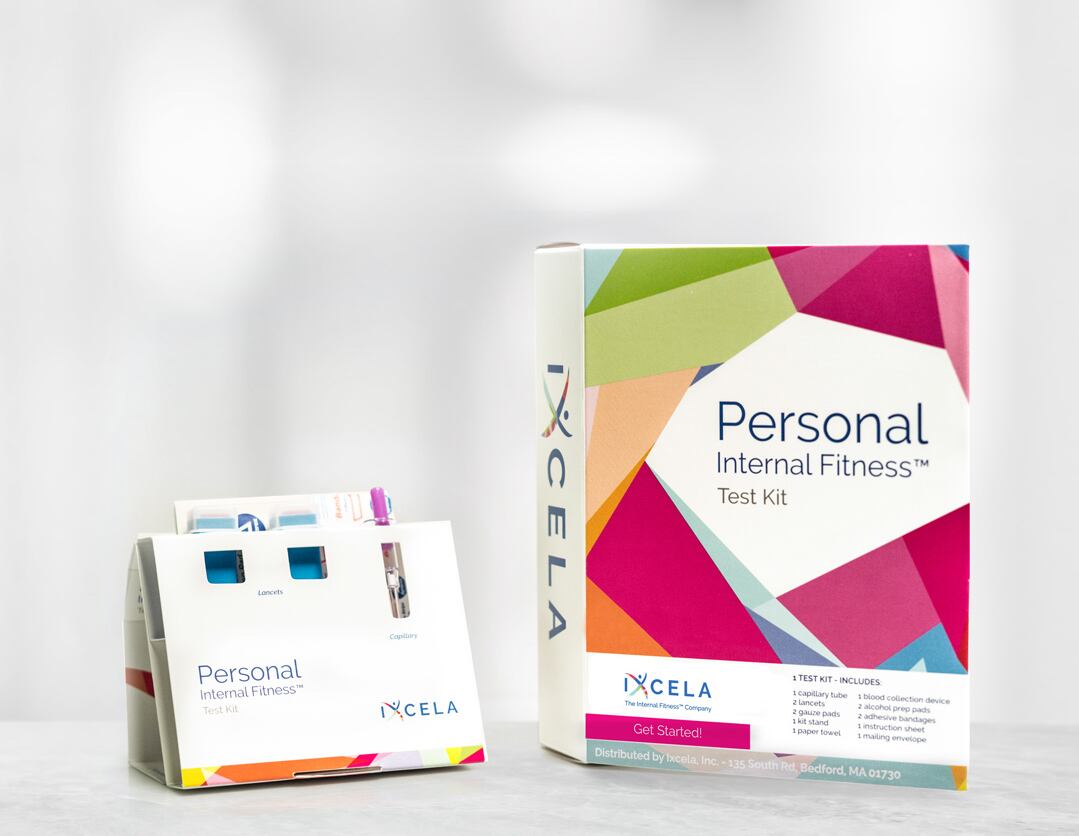The approach was pioneered by co-founder Wayne Matson, PhD, who was one of the early figures in the functional medicine movement. Matson’s insight, which was developed further by CEO Erika Angle, PhD, was to drive at the ultimate goal of a healthy gut, that being a suite of appropriate metabolites at proper levels in the blood.
Ixcela developed a pinprick blood test that looks at the levels of these small molecule metabolites. Angle said that peer-reviewed literature and clinical studies have associated these with gut health.
Proprietary analysis

Analysis of the blood spot is done with the company’s proprietary technology, which includes an electrochemical array developed by Matson that is trademarked as CoulArray.
Among the metabolites the company looks for in the blood tests are those that would be familiar to any reader, including serotonin, tryptophan and uric acid. Others that are less well known include indole-3-priopionic acid, indole-3 acetic acid and indole-3 lactic acid.
Angle said that the idea for the company was an outgrowth of Matson’s career of looking for answers to health questions within the blood. Whatever is right or wrong with the body, indications of those states will find their way into the circulatory system.
“Dr Matson was one of the founders of the functional medicine movement along with Dr. Jeff Bland,” Angle told NutraIngredients-USA. “Over the course of his career he has probably run 30,000 or 40,000 samples. He ran samples for NASA looking for DNA damage among folks who had spent time on the International Space Station.”
“One of the things that we noticed when looking at the data from these tests is that there is a subset of molecules that appear over and over. And we saw in the literature these were being associated with risk factors that were predictive of disease,” she said.
“Where did these things come from? It became clear that these were either secreted directly by gut microbes or were regulated by the microbiome,” Angle said.
What the microbiome does, rather than what it is
Ixcela’s approach to microbiome functionality, then, is to look at what a healthy microbiome does rather than what it is. There is an increasing body of data on different gut microbiome profiles, and how those might be shifted by one intervention or another. More fiber, more protein, less sugar, more exercise, etc. But there is less information on what those profile shifts mean.
Similarly, many probiotics companies might point to data about the effects their products have. But the outcomes are usually crude measures of stool consistency, volume or frequency, or relative scores on questionnaires about gut comfort or quality of life.

Those measures then can be associated with health improvements. And dysbiosis can be associated with certain conditions, such as Alzheimer’s disease or ADHD. But to date there is still no direct biomarker measurement of gut health, one with which a health practitioner could say, “Hit this number and you’re good.”
Angle said Ixcela is taking a more targeted approach. And, being a pinprick blood test as opposed to gathering and mailing stool samples, it’s one that would likely be more palatable to consumers.
“What we are measuring is not merely what type of bacteria you have in your gut, we are actually measuring the functionality of your gut’s output. Is your gut producing the molecules you need to be healthy?” she said.
Sports performance tie in
Along with marketing the test to health practitioners and consumers, the company is also developing sports partnerships. Scott Tindal, who holds the title of performance coach and nutritionist, is helping to build out that side of the business. The company says it already has some of these partnerships in place, including a deal with an NFL team.
R

ecently Tindal was the physiotherapist and nutritionist for the Oracle sailboat racing team in the America’s Cup. Those sailors are light years away from the gin swilling yacht racing bums of yore. Controlling a machine that generates enough horsepower to move across the water at 50 mph or more using only human muscle power is a daunting prospect, he said.
“They’re really more like players on a rugby team,” Tindall said. “One of our players, in a 20-to 25-minute race, averaged a heart rate of 180 bpm, and at his peak he went over 210.”
Tindall said the interest from sports teams has not been so much from a performance improvement aspect. Rather, he said, these potential customers are looking for ways to keep their players healthy so that they are more consistently available for training and for game day participation.
All encompassing solution
In addition to the test results, customers will also be directed to a suite of dietary supplements for purchase, nutrition advice and exercise coaching. The company is offering these as integrated plans. A one time test costs $299, whereas for a monthly $140 fee a subscriber receives periodic retests, a supply of the recommended supplements as well as the coaching and nutrition support.
“We didn’t want to be a supplement company per se. What I did want was to be an all encompassing solution. You take a test and then what? With so many supplements on the shelves, which one should that customer or patient take?” Angle said.
As will other testing firms, such as 23andMe, one of the goals its to amass a pile of potentially marketable data. Angle said with that in hand, the goal of a validated set of gut health biomarkers might be within reach. Angle said the company has had feelers from academic institutions to collaborate on research as well as from other personalized fitness companies.
“When you get a large enough body of consumers you can do some data mining. And some of the wearable device companies have reached out to us. This could be a companion product in many ways,” she said.
